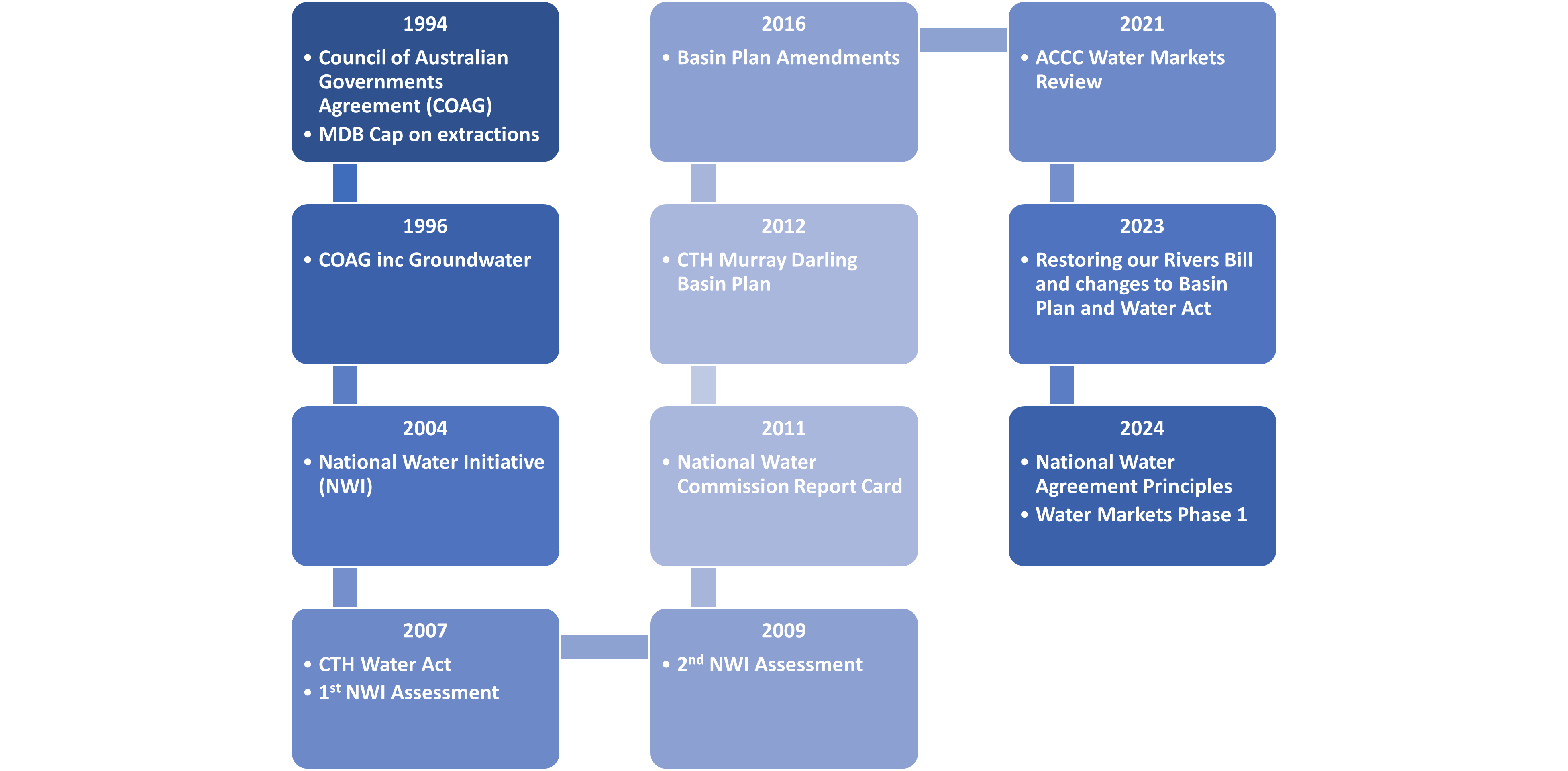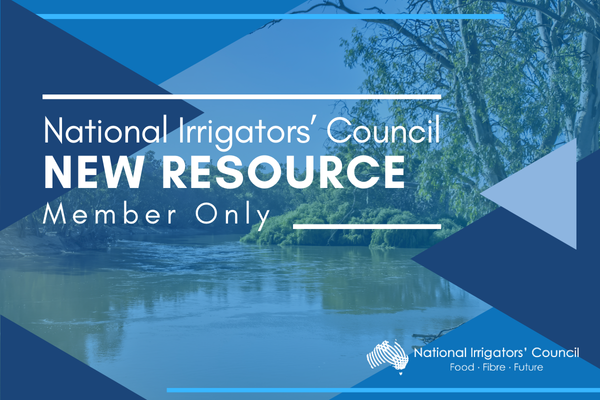NATIONAL IRRIGATORS’ COUNCIL
POLICY PORTFOLIO - WATER LAW AND PLANNING
Advocating for the Australian irrigated agriculture industry

NATIONAL IRRIGATORS’ COUNCIL
Advocating for the Australian irrigated agriculture industry

The Australian Constitution outlines that Australia's waters are the responsibility of State and Territory jurisdictions (Section 100).
Overtime Federal Government intervention and direction in water policy has increased. Particularly due to coordination across state boundaries and the desire for national consistency through Federal oversight has been enabled. This has progressively occurred as water resources were developed.


Australia's foundational document for water law and planning is arguably the National Water Initiative which was agreed in 2004 as an intergovernmental agreement after more than a decade of discussions from the first Council of Australian Governments meeting in 1994. States and Territories agreed in 2004 to implement 10 objectives and complete more than 110 actions to implement the agreement, including the creation of state water management law, which is how the NWI become the blueprint for Australian water management.
"23 Objectives:
Full implementation of this Agreement will result in a nationally-compatible, market, regulatory and planning based system of managing surface and groundwater resources for rural and urban use that optimises economic, social and environmental outcomes by achieving the following:
i. clear and nationally-compatible characteristics for secure water access entitlements;
ii. transparent, statutory-based water planning;
iii. statutory provision for environmental and other public benefit outcomes, and improved environmental management practices;
iv. complete the return of all currently overallocated or overused systems to environmentally-sustainable levels of extraction;
v. progressive removal of barriers to trade in water and meeting other requirements to facilitate the broadening and deepening of the water market, with an open trading market to be in place;
vi. clarity around the assignment of risk arising from future changes in the availability of water for the consumptive pool;
vii. water accounting which is able to meet the information needs of different water systems in respect to planning, monitoring, trading, environmental management and on-farm management;
viii. policy settings which facilitate water use efficiency and innovation in urban and rural areas;
ix. addressing future adjustment issues that may impact on water users and communities; and
x. recognition of the connectivity between surface and groundwater resources and connected systems managed as a single resource."
Furthermore, the NWI called for the unbundling of land and water, creating a separate property right - water access entitlement, to land rights.
"28 Water Access Entitlements:
The consumptive use of water will require a water access entitlement, separate from land, to be described as a perpetual or open-ended share of the consumptive pool of a specified water resource, as determined by the relevant water plan (paragraphs 36 to 40 refer), subject to the provisions at paragraph 33.
31. Water access entitlements will:
i) specify the essential characteristics of the water product;
ii) be exclusive;
iii) be able to be traded, given, bequeathed or leased;
iv) be able to be subdivided or amalgamated;
v) be mortgageable (and in this respect have similar status as freehold land when
used as collateral for accessing finance);
vi) be enforceable and enforced; and
vii) be recorded in publicly-accessible reliable water registers that foster public
confidence and state unambiguously who owns the entitlement, and the nature of
any encumbrances on it (paragraph 59 refers).
32. Water access entitlements will also:
i) clearly indicate the responsibilities and obligations of the entitlement holder
consistent with the water plan relevant to the source of the water;
ii) only be able to be cancelled at Ministerial and agency discretion where the
responsibilities and obligations of the entitlement holder have clearly been
breached;
iii) be able to be varied, for example to change extraction conditions, where mutually
agreed between the government and the entitlement holder; and
iv) be subject to any provisions relating to access of water during emergencies, as
specified by legislation in each jurisdiction."
In 2007, a Commonwealth Water Act to address environmental concerns and further support consistency of management in the Murray Darling Basin was forged. It is Australia's primary legislation that concerns the Commonwealth Government's powers over the Murray–Darling Basin and enables the establishment of the Murray Darling Basin Plan, and assciated beauracraces of the Murray Darling Basin Authority, the Commonwealth Environmental Water Holder and the Inspector General Water Compliance to implement and enforce the plan.
The Act's objectives include the management
of the Basin's water resources,
addressing threats
to the Basin,
promoting the environmentally,
economically and socially sustainable use
of the Basin's resources, conservation of
the Basin ecosystem,
maximising the economic benefit to the Basin communities, and improving water
security.

This update relates to persons or classes of people required to report water market information under the Australian Government water market
regulation - this can be IIOs and water intermediaries.
DCCEEW are seeking feedback on the Exposure Drafts for the proposed Water Amendment (Water Markets Information) Regulations 2026
(Regulations) and the Water Market Data Standards. These form the final pieces of the water market reform roadmap and are due for
implementation in 2026.
Exposure drafts and a survey for feedback are provided on the webpage.

Irrigation Australia Limited's Spring Journal features our CEO, Zara Lowien's comments on the 2025 Basin Plan Evaluation (on page 32-35) indicating there were plenty of first the MDBA's 'game changing' 2025 evaluation but what does it mean for the irrigation industry. Zara highlighted the opportunity before Minister Watt has to work collaboratively with communities and industry on a much-needed reset, that looks to refocus the Basin Plan on outcomes rather than numbers.

Australian Farm Institute, Executive Director Katie McRobert says "Much of Australia’s agricultural policy is caught in a loop. When a crisis erupts – be it drought, market disruption, or community outrage – political and media attention surges. Decisions are demanded, headlines written, levers pulled. But as the immediate threat subsides, so too does the will to implement lasting solutions...This edition of the Farm Policy Journal explores that cycle – and asks what we can do to break it. ....The opening article by Christine Freak and Zara Lowien examines the long and often reactive trajectory of water policy reform in the Murray–Darling Basin (MDB)...[They] offer offer an original contribution to this challenge in the form of the Triple Crown of Water Reform Framework, which conceptualises reform as a three-pronged effort: water-sharing (Flows), watermanagement (Functions), and integrated resource initiatives (Further)."

If there's one video those working in water must watch this year, it's this - Professor Forest Reinhardt from Harvard Business School talking to Andrew McConville at this years River Reflections Conference on water property rights (watch from 45 minutes
into Day 1).
Let us know your favourite quotes!
One of our favourites (1hr 18mins in) - in response to a question on what a future Basin Plan should look like: "If the subsequent
versions of the Basin Plan, can make water more and more like a normal commodity... just as if you own a piece of land... I think
that the more you can make water rights look like normal property rights, the more effective the system will be. I come from a country
where we can't even get to the starting line of that kind of thing."
|
NIC Members agreed to a specific Position Statement on the reliability of water access entitlements to provide a clear message to Governments on how decisions impact water property rights, as represented and agreed in the National Water Initiative. This position statement was prepared in conjunction with our guiding principles. Approved 17 July 2025. |
NIC Members agreed to amend and update our Aboriginal Water Position Statement, and agreed to the following Position Statement titled 'enabling Cultural objectives in water management'.
This position statement was prepared in conjunction with our Murray-Darling Basin Position Statement and our Positon Statement on
reliability of water entitlements and our guiding principles.
Approved 17 July 2025.

The NIC recently provided DCCEEW with feedback into the Exposure Draft for Water Amendment (Water Markets Intermediaries Code and Trust Accounting Framework) Regulations 2025 as part of the ongoing consultations on the matter. NIC acknowledges the commitment of the Water Market Reform team to consider the feedback throughout the multiphase engagement. However, we offer the following as considerations for further clarity within the proposed regulations as well as recommendations regarding the timing of the regulations. [...]

DCCEEW today released the Exposure Draft of the Water Markets Intermediaries Code (the Code) and an Overview of the draft are now available for consultation. On this page you will be able to submit your feedback on the Exposure Draft. The consultation will be open until 11.59pm on Sunday 6 April 2025. The Exposure Draft incorporates feedback from the Policy Position Paper consultation in November-December 2024.

DCCEEW today released their Final policy position paper on the water market intermediaries trust accounting and code exemptions, the final
position to inform the future exposure regulations.
We will review this with interest given the concerns raised regarding the likely impacts and expectations on some intermediaries.
Find out more about our community, and join our mission advocating for the Australian irrigated
agriculture industry.